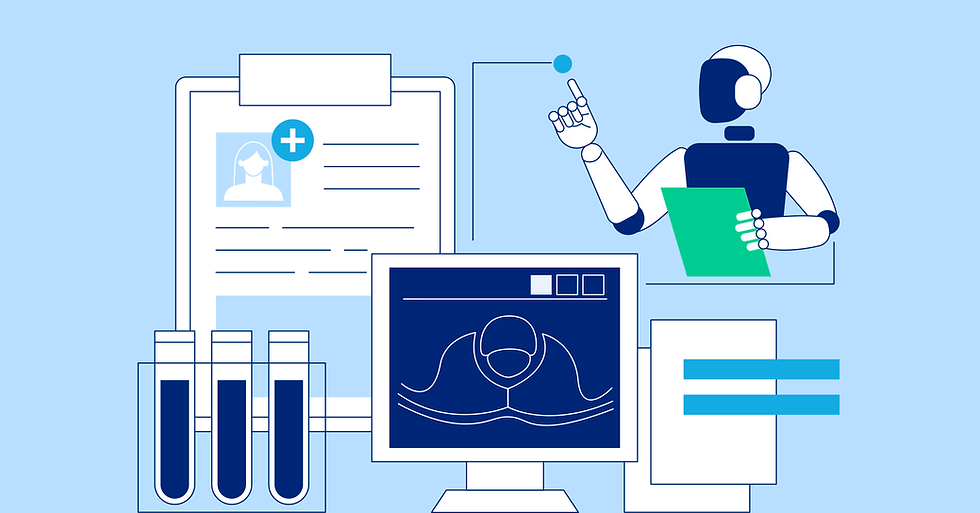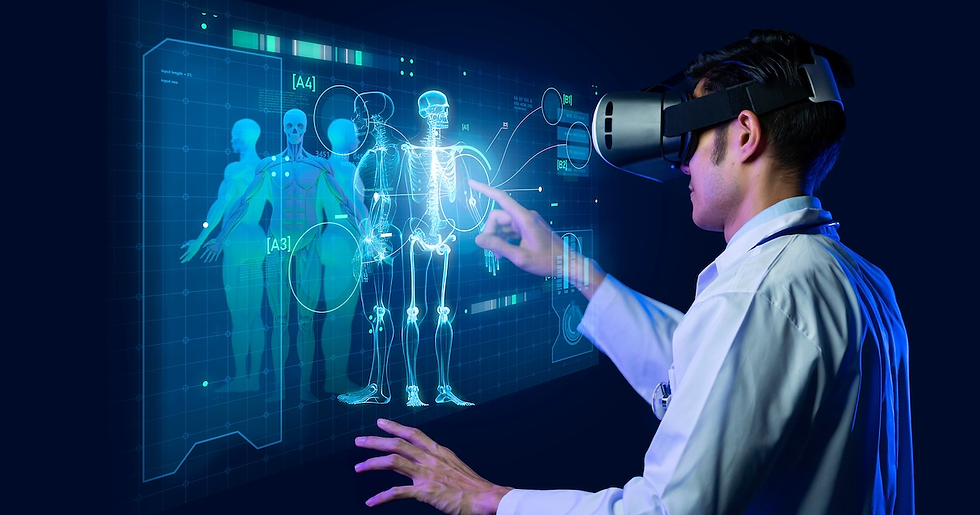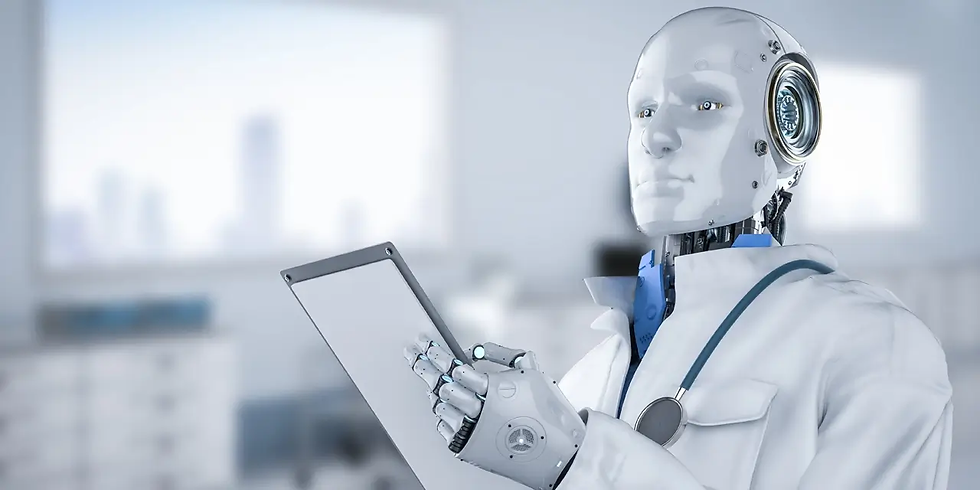A Comprehensive Understanding of AI in Healthcare: How Will It Reshape Our World?
- Aisha Washington

- Sep 22, 2025
- 5 min read

Introduction
What if a simple recording of your cough could tell a doctor if you have tuberculosis? In Pakistan, researchers used an AI model to analyze cough recordings with 90% accuracy in detecting TB “researchers used an AI model to analyze cough recordings with 90% accuracy”. For years, the internet has been jokingly called the “hypochondriac’s best friend,” capable of escalating a minor headache into a terminal diagnosis with a few clicks. But behind the scenes, a much more profound transformation is underway. AI is quietly, but radically, shifting the landscape of medicine, moving beyond drug discovery and protein research to fundamentally change how we diagnose and treat illness. This technology promises not only to enhance the capabilities of our medical professionals but also to bring healthcare to parts of the world that have little to no access.
What Exactly Is AI in Healthcare? — Core Definition and Common Misconceptions

At its core, AI in healthcare is the use of machine learning algorithms to analyze complex medical data and uncover insights that might be invisible to the human eye. This began with “narrow AI,” such as Google DeepMind’s system that identifies over 50 eye diseases from retina scans as well as specialists “system that identifies over 50 eye diseases from retina scans”. However, the field is rapidly advancing toward holistic, multimodal systems that integrate various data types at once.
Augmentation, Not Replacement
AI is envisioned as an advanced spell checker for physicians. At Mount Sinai, an AI “time-out” tool vetting surgery checklists reduced anesthesia adverse events by 30% “reduced anesthesia adverse events by 30%”, flagging inconsistencies in real time while the anesthesiologist remained in charge.
Data-Driven Discovery
By training on vast datasets—including medical images, genomic sequences, sound recordings, and electronic health records—AI systems can identify subtle patterns. A Stanford study showed an AI could predict cardiovascular risk from retinal images alone “predicted cardiovascular risk from retinal images alone”.
Multimodality
New AI systems can analyze genomics, tissue slides, imaging, and wearable data together. Mayo Clinic researchers combined Fitbit sleep data with genomic markers and MRI scans to predict Alzheimer’s progression two years earlier than standard tests “predicted Alzheimer’s progression two years earlier”.
Myth Busting: Fact vs. Fiction
Myth: AI will make doctors obsolete
Fact: AI frees doctors from administrative burdens. At the Cleveland Clinic, an AI tool flagging pulmonary embolisms in CT scans increased detection rates by 20% “increased detection rates by 20%” while physicians made final decisions.
Myth: You can get a reliable diagnosis from a public chatbot
Fact: Chatbots like Gemini are programmed not to give medical diagnoses and will direct you to a professional “programmed not to give medical diagnoses”.
Myth: Medical AI is infallible
Fact: Algorithms trade off sensitivity and specificity. One FDA-cleared skin cancer tool had a 15% false-positive rate on darker skin tones “15% false-positive rate on darker skin tones”, prompting retraining on diverse datasets.
Why Is AI in Healthcare So Important? — Its Impact and Value
AI extends from individual care to global health. In Thailand, an AI for diabetic retinopathy screened 700,000 people, detecting early disease in 12% who otherwise would have gone unrecognized “screened 700,000 people, detecting early disease in 12%”. Society benefits as AI can scale expertise to meet workforce shortages and combat physician burnout by automating tedious tasks—one hospital reported saving 4,000 physician hours per year on radiology reports “saving 4,000 physician hours per year”.
Research and Development
AI accelerates drug discovery. Insilico Medicine used an AI-driven platform to identify a novel fibrosis drug candidate in 46 days “identify a novel fibrosis drug candidate in 46 days”, now entering Phase I trials.
The Evolution of AI in Healthcare: From Past to Present
The journey began with segmenting the larynx in speech therapy research and has exploded into narrow AI systems like Qure.ai’s TB chest X-ray screener in India, processing 250,000 images “processing 250,000 images”. Today, comprehensive models like Med-PaLM and Med-Gemini fuse large language models with multimodal datasets to answer complex clinical queries “fuse large language models with multimodal datasets”.
How AI in Healthcare Works: A Step-by-Step Reveal

The Foundation: Data and Ground Truth
High-quality labeled data are essential. In diabetic retinopathy projects, UK panels of 50 ophthalmologists established consensus diagnoses via majority vote “established consensus diagnoses via majority vote”.
The Core Mechanism: Training and Fine-Tuning
AI models learn patterns from input-output pairs like a spell checker learning from a dictionary. Fine-tuning general models on specialized datasets—such as 2 million chest CT scans—yields domain expertise while retaining broad reasoning abilities “Fine-tuning general models on specialized datasets”.
The Process in a Clinic
Input: A fundus camera captures a retinal image.
AI Analysis: The algorithm evaluates biomarkers for disease.
AI Output: A severity score, lesion heatmap, or probability is displayed.
Human-in-the-Loop: A physician reviews and integrates AI suggestions with patient history before making the final call.
How to Observe AI in Healthcare in Real Life

For Patients
Use symptom-checkers like Ada to learn about conditions but always consult a doctor “Use symptom-checkers like Ada”.
Participate in anonymized data-sharing; Alzheimer’s programs recruit volunteers to contribute wearables and genetic data for research “contribute wearables and genetic data”.
For Healthcare Systems
Ensure human-in-the-loop for every AI decision.
Tailor risk thresholds by use case—for example, rural triage tools may accept lower specificity than surgical planning aids.
Uphold privacy and equity under regulations like GDPR and HIPAA, ensuring data benefits return to source communities “ensuring data benefits return to source communities”.
The Future of AI in Healthcare: Opportunities and Challenges
Future Trends
Conversational AI for Diagnosis: AMIE holds diagnostic interviews before physician review “AMIE holds diagnostic interviews”.
Holistic Health Integration: German pilots link genetic, CGM, and diet logs for personalized diabetes care “link genetic, CGM, and diet logs”.
Digital Twins: “In silico” trials simulate virtual cohorts, reducing animal testing by 40% “reducing animal testing by 40%”.
Opportunities
Cracking Intractable Diseases: AI-driven Alzheimer’s biomarker discovery through PET-proteomics correlation.
Democratizing Expertise: Dermatology apps now screen lesions in remote African clinics “screen lesions in remote African clinics”.
Personal AI Assistants: Kaiser Permanente trials show AI bots improve medication adherence by 25% “improve medication adherence by 25%”.
Challenges
Accuracy and Hallucinations: Diagnostic AI must clear stringent FDA/EMA evaluations to mitigate errors.
Data Privacy and Ethics: Transparent consent and encryption protect participant rights.
Over-reliance: Harvard’s “Clinician-AI Partnership” course trains future doctors on effective AI collaboration “Clinician-AI Partnership course”.
Conclusion: Key Takeaways on AI in Healthcare
AI is an augmentation tool, enhancing physician expertise without replacing human judgment.
Data is the bedrock, built on diverse, well-labeled datasets from millions of patients.
AI promises to expand access, delivering specialized screening globally and reducing health disparities.
A cautious, pilot-to-regulation approach balances innovation with safety.
The future is holistic, personalized medicine, uniting genomics, imaging, and lifestyle for predictive care.
Frequently Asked Questions (FAQ) about AI in Healthcare

Q1: What is “narrow AI” in healthcare?
Systems trained for a single task, like analyzing chest X-rays for pneumonia.
Q2: Can medical AI systems make mistakes?
Yes—melanoma detectors showed a 12% false-positive rate on atypical moles, requiring expert review.
Q3: How is an AI diagnosis different from a human doctor’s?
AI excels at data pattern detection; doctors provide context, empathy, and nuanced judgment.
Q4: What happens to my data if used for AI research?
Data are anonymized, encrypted, and governed by strict protocols, with participants receiving study summaries.
Q5: Will AI ever be as empathetic as a human doctor?
AI trained on patient-doctor dialogues scored 4.8/5 on empathy when coaching lifestyle changes “scored 4.8/5 on empathy”.


